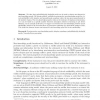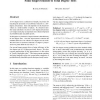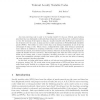121
click to vote
ASIACRYPT
2010
Springer
15 years 4 days ago
2010
Springer
We show that probabilistically checkable proofs can be used to shorten non-interactive zero-knowledge proofs. We obtain publicly verifiable non-interactive zero-knowledge proofs fo...
122
Voted
SIAMCOMP
1998
15 years 1 months ago
1998
This paper continues the investigation of the connection between probabilistically checkable proofs (PCPs) and the approximability of NP-optimization problems. The emphasis is on p...
118
click to vote
AC
2000
Springer
15 years 1 months ago
2000
Springer
Abstract. In the late 80's Blum, Luby, Rubinfeld, Kannan et al. pioneered the theory of self
114
click to vote
RSA
2006
15 years 2 months ago
2006
We continue the investigation of locally testable codes, i.e., error-correcting codes for whom membership of a given word in the code can be tested probabilistically by examining ...
113
click to vote
ISTCS
1995
Springer
15 years 5 months ago
1995
Springer
A low-degree test is a collection of simple, local rules for checking the proximity of an arbitrary function to a lowdegree polynomial. Each rule depends on the function’s value...
111
click to vote
STACS
2001
Springer
15 years 6 months ago
2001
Springer
Most known constructions of probabilistically checkable proofs (PCPs) either blow up the proof size by a large polynomial, or have a high (though constant) query complexity. In thi...
102
click to vote
COCO
2005
Springer
15 years 7 months ago
2005
Springer
A property tester with high probability accepts inputs satisfying a given property and rejects inputs that are far from satisfying it. A tolerant property tester, as defined by P...
108
click to vote
APPROX
2005
Springer
15 years 7 months ago
2005
Springer
An error-correcting code is said to be locally testable if it has an efficient spot-checking procedure that can distinguish codewords from strings that are far from every codeword...




